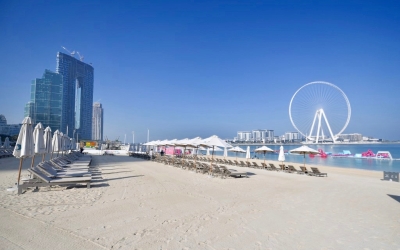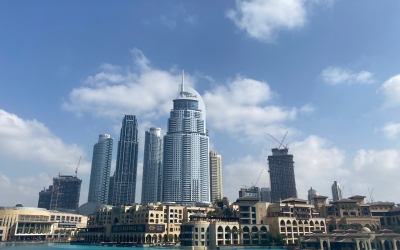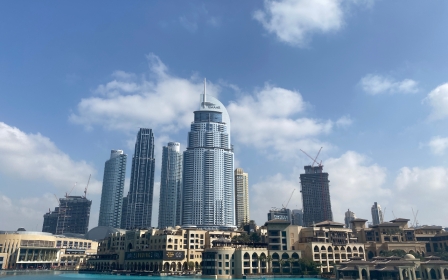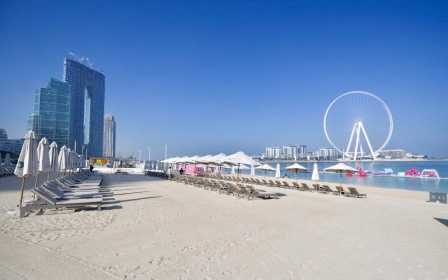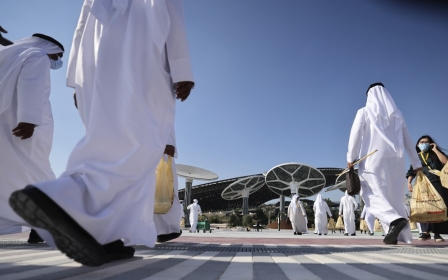Covid-19: Migrant workers stranded in Dubai after Saudi and Kuwait travel ban
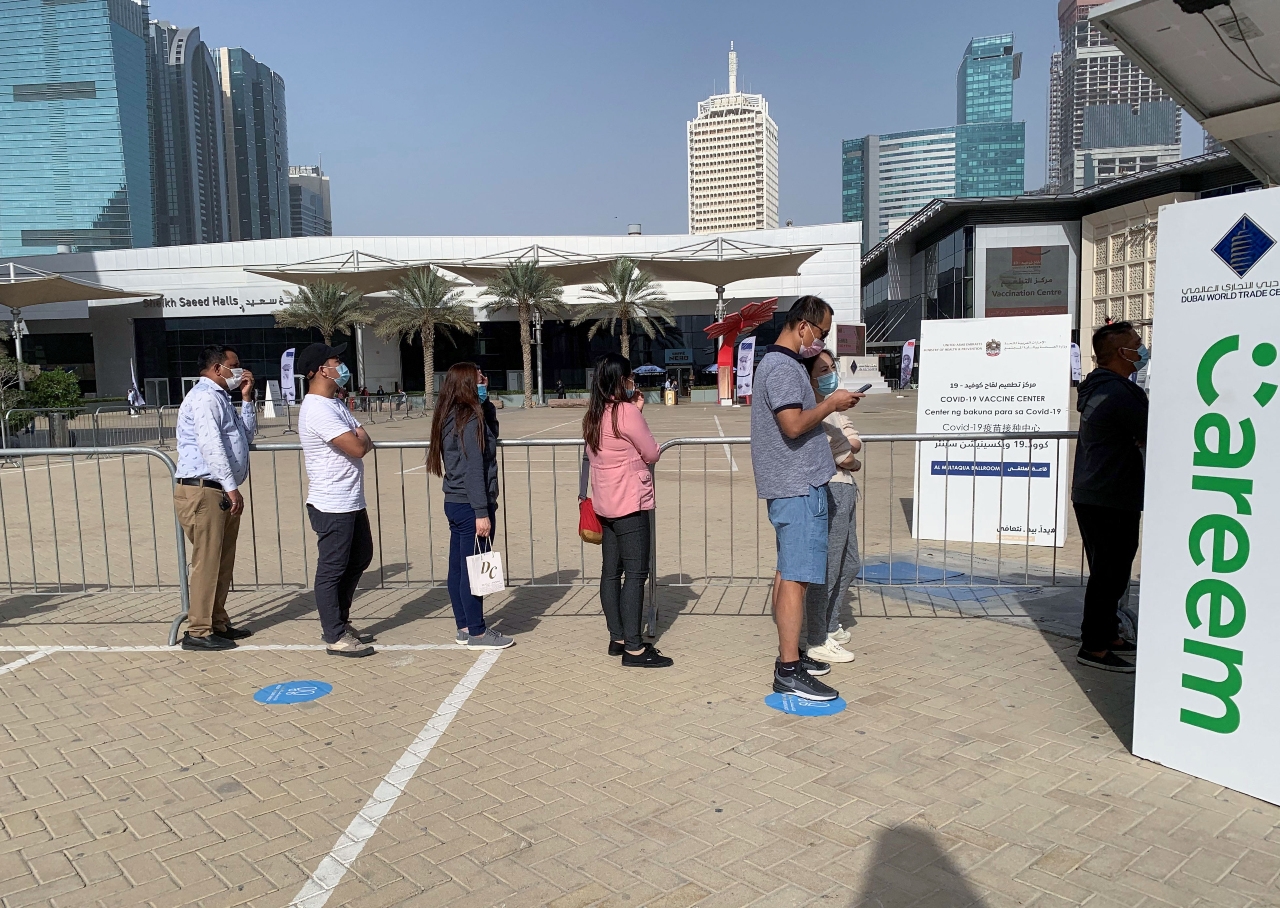
Thousands of migrant workers bound for Saudi Arabia and Kuwait have been stuck in Dubai after both countries imposed a two-week entry ban for foreigners as Covid-19 cases surge.
While Saudi Arabia’s ban started from 3 February and covered migrants from 20 countries, Kuwait’s began on 7 February and covers all foreigners except first-degree relatives and servants of citizens.
Saudi Arabia was off-limits to foreigners most of last year as it struggled to contain the pandemic.
The prolonged suspension of flights that began on 14 March had only ended on 3 January.
What makes the entry ban particularly troublesome this time is the inclusion of the United Arab Emirates (UAE) in the list of countries that Saudi Arabia has banned all flights to and from.
Before the ban, those who wanted to fly from countries where there were no direct flights had been using Dubai as a transit hub to reach Saudi Arabia and Kuwait.
Apart from the UAE, the Saudi list includes Egypt, Lebanon, Turkey, Germany, France, Italy, Ireland, Portugal, Switzerland, Sweden, Brazil, Argentina, South Africa, India, Indonesia, Pakistan, Japan, the US and the UK.
Rude shock
For expatriate workers who had come to Dubai after mid-January en route to Saudi Arabia or Kuwait, the travel ban was a rude shock.
Covid-19 lockdowns, a lack of work and family reasons, such as dying parents, meant many had left Kuwait and Saudi Arabia and then returned.
With the initial lifting of travel bans to the two countries, many expatriate workers had rushed to Dubai to reach their destination before the expiration of their visa.
The majority of those stranded had borrowed heavily from friends and relatives to spend an average $1,100 on a “Dubai package” - which covered the airfares from their home country to the UAE and then on to Saudi Arabia/Kuwait, a 14-day hotel stay, food, visa charges and a mandatory Covid-19 test.
I paid 72,000 Indian rupees to a travel agent. Now my time is up in the hotel, and they are asking if I need to renew my stay for a daily rent of 120 dirhams, excluding food
- Abdul Sathar Thamarath, stranded worker
Abdul Sathar Thamarath, who works for a pharmaceutical distributor in Riyadh, landed in Dubai on 22 January.
He should have been on board a Saudi-bound plane on 7 February, after the quarantine period.
“I paid 72,000 Indian rupees ($989) to a travel agent. Now my time is up in the hotel, and they are asking if I need to renew my stay for a daily rent of 120 dirhams ($32.67), excluding food,” he told Middle East Eye on Saturday.
“There are over 200 such people in his hotel. Over 90 percent of them are Indians. Then there are Egyptians bound for both Kuwait and Saudi.”
Thamarath described an atmosphere of panic among the hotel residents, with families also among those stuck. For many, either their visa or re-entry time is expiring.
Some are not able to renew their visas online, while others have returned home unable to bear the expense. The rest are contacting their sponsors and companies to renew their visa or re-entry period.
Thamarath said he was looking for cheaper accommodation options. “Some of us are thinking to move to a shared apartment or villa where we can also cook our food for a rent of 300 dirhams ($81.67)," he said, of a two-week stay, before adding that everyone now also fears airfare increases after flights resume.
Lack of support
Thamarath said many Indians had been expecting their country to intervene diplomatically over the situation.
However, the Indian embassy in Abu Dhabi has asked all Indians in the UAE en route to Saudi Arabia or Kuwait to “consider returning to India and make their further travel plans only after the restrictions in the final destination countries are lifted”.
The embassy also advised carrying “enough personal provisions and funds to cater to any emergent requirements”.
Arif Kurungot, a travel agent from Kerala, said: “Two of my clients were supposed to go from Dubai to Kuwait on 22 January, but they couldn’t as the flight capacity was reduced to 35 passengers.
"They extended it to 7 February, the same day Kuwait imposed the ban. They spent $412 for Dubai-Kuwait tickets alone.
“The only option before them is to return home. Their visa period ended, and all their spending in Dubai was wasted.”
The last time Saudi authorities imposed the ban, the UAE extended tourist visas for another month, but they failed to do so this time round.
Furthermore, an extension is unlikely now because travellers have a chance to return home through an air bubble.
Oman-Bahrain options
On Monday, MEE again contacted Thamarath, who had now shifted to his friend’s room in Ajman, another UAE emirate some 50km from Dubai.
He said people had begun to borrow money from friends and relatives in the UAE or get it wired from home.
“Many are trying to get to Oman and Bahrain because Saudi flights are still flying from there,” he said.
Those who are entitled to on-arrival visas fared better. “On my last day in the hotel, a group of seven left for Bahrain. One of them was sent back from the airport and said he wouldn’t get a visa on arrival. He was a house driver,” said Thamarath.
Expatriates from more senior professions were allowed to travel between Gulf countries without a prior visa. Not that these alternative transit options are cheaper and easy.
Travellers will have to undergo another quarantine for two weeks and pay 50 Bahranian dinars ($132) for a visa and 40 ($106) for two Covid-19 tests, to be paid upon arrival in Bahrain.
Thamarath says a family of four bound for Dammam spent around $4,120 for a similar detour via Oman.
All-inclusive packages
Ahmed Salih of Kerala’s Al Jouf Travels said 20 of his customers are stranded in Dubai, and all are now staying in various apartments after their hotel stay came to an end.
“Those who can afford to have returned, others are staying with hope,” he said, adding that people are still ready to pay for the Oman route to Saudi, which can now cost up to $4,120.
Ajmal Mufeed says his firm is now offering two Saudi packages via Bahrain and Oman for $798 and $756, respectively.
According to promotional material seen by MEE, the Bahrain package covers a 13-night four-star hotel stay, three packed meals a day, health insurance, two PCR tests at Manama airport on arrival and departure, transportation for a second Covid test after the first week in Bahrain, free WiFi, Bahrain visa charges and transportation to Dammam and al-Khobar in Saudi Arabia.
The Oman package additionally offers “Tarassud+ app registration help”, a “bracelet removal fee” upon leaving Oman, and the “ministry stamping fee of test reports”.
However, the agency emphasises its non-refundable policy and warns people of possible “rule changes”.
Miracle seat
Faadi Abdul Kader, an expatriate electrical engineer in the Saudi city of Taif, left for Dubai on 22 January to pick up his wife, Hena Cherayakkattu, who had come from India to join him a week before.
They were married last year and were waiting to start their family in Taif, where Abdul Kader had arranged a family visa.
He had booked a Dubai-Jeddah Saudi Airlines ticket for 5 February. But with the sudden news of the flight ban, they hastily rearranged to travel two days earlier, booking an Abu Dhabi-Dhamman journey on a Flynas plane.
On the morning of the flight, Abdul Kader was told it had been cancelled. The couple rushed to the airport and Abdul Kader got a single business class ticket for 5,400 dirhams ($1470).
A previously cancelled Saudia plane to Jeddah was returning, probably to avoid a parking fee at Dubai. Abdul Kader’s wife stayed in the queue, hoping for a miracle, and got one. A cancellation saw her board a plane.
Abis Bishara, an Indian expatriate in Riyadh, told MEE of an elderly couple from India who embarked for Saudi Arabia to visit their daughter who was expecting a child last week.
“But they couldn’t make it to Saudi. The ban came. The daughter gave birth to a child. The parents returned to India not being able to see their new grandchild,” said Bishara.
Dubai dangers
For many, Saudi Arabia and Kuwait's decision to ban travel from Dubai has not come as a surprise.
The region's tourism hub, Dubai was open to holidaymakers and influencers over the winter, when most such destinations in the world were off-limits due to Covid.
Helal Saeed al-Marri, Dubai’s director-general of tourism, boasted of 500,000 tourists visiting the emirate in December. In January, reports of super-rich foreigners taking "luxury vaccine holidays" in Abu Dhabi and Dubai emerged.
As a result, the emirate has seen the biggest surge in cases in the region, with daily infections tripling in around six weeks to a record 3,977 last week.
At the beginning of February, Dubai ordered bars and pubs to close until the end of the month to suppress the spike.
The closures were among a raft of steps "taken in response to rising violations of preventive measures," authorities said in a statement.
On Tuesday, Dubai police fined a party organiser 50,000 ($13,612) dirhams and guests 15,000 ($4,083) each.
Meanwhile, charities in the UAE that were very active during the height of Covid-19 last year are not able to help this time.
“The government is unlikely to give us permission to operate a community accommodation to the stranded because there are lots of restrictions on even a small gathering,” a charity worker told MEE.
On Wednesday, the Indian Cultural And Art Society, an expatriate body, housed more than 200 people in a facility set up at a vacant labour camp in Fujairah, an emirate located 120 km from Dubai, according to Shajir Piriyummantakath, a beneficiary.
'A lot of uncertainty'
The exact number of migrant workers stranded in Dubai en route to Saudi Arabia and Kuwait remains unknown.
Ajmal Mufeed, who works for New Delhi’s Alhind Tours & Travels, said the figure stands at around 3,000, according to the Travel Agency Federation of India.
On Monday, MCA Naser, the Middle East news head of MediaOne, a leading Indian expatriate TV network, put the figure at 5,000 in a Facebook live post.
Despite the problem, expatriates are still coming to Dubai, as tourist visas are easier to get and the city is unlikely to stop travellers from coming.
Many passengers hope Saudi Arabia will not extend the ban beyond two weeks.
Ibrahim Khaleel, a lawyer and the secretary of the Kerala Muslim Cultural Centre charity, blames the situation on travel agents for not discouraging people.
One travel agent, Arif Kurungot, said he is not keen to sell packages to customers now.
“There’s a lot of uncertainty these days, especially over Saudi and Kuwait. Now we do ticketing only to Dubai,” he said.
“They can call me when they need a ticket to the next destination after their quarantine time,” he added, saying that people book a ticket in advance because they fear the airfare might increase.
“In the event of flight cancellation, the airlines extend the date but never refund, and they may charge the fare difference of the day,” he explained.
“When the Kuwait-Dubai route started, many came to us. Hundreds of them. They spent $1,373 for Dubai-Kuwait alone. Those who couldn’t afford to stay returned to India.”
Many South Asians trying to get to Saudi Arabia and Kuwait are now trying routes via Sri Lanka, the Maldives and Nepal because those countries are not banned.
Middle East Eye propose une couverture et une analyse indépendantes et incomparables du Moyen-Orient, de l’Afrique du Nord et d’autres régions du monde. Pour en savoir plus sur la reprise de ce contenu et les frais qui s’appliquent, veuillez remplir ce formulaire [en anglais]. Pour en savoir plus sur MEE, cliquez ici [en anglais].


